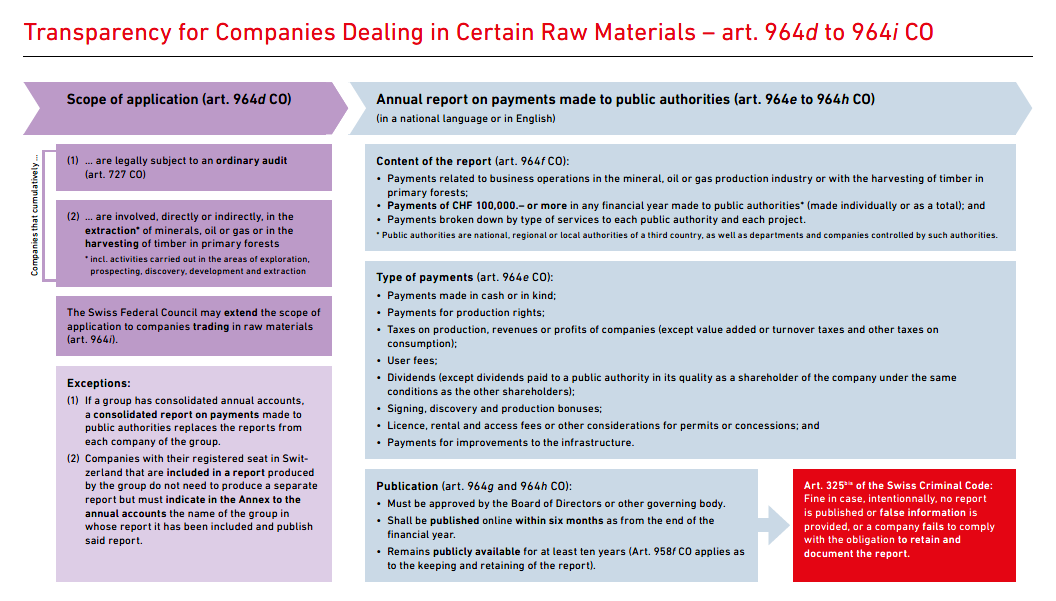Your contacts
Switzerland has updated its legislation in 2021 and in 2022 to include transparency and non-financial reporting requirements, specifically on CO2 goals, social issues, employee-related issues, respect for human rights and combating corruption as well as due diligence and transparency duties in relation to minerals and metals from conflict-zones and child labour.
We have prepared user-friendly cheat sheets that summarise the key aspects of these requirements.
In the last years, the Swiss Federal Assembly has adopted several provisions to ensure that Switzerland does not miss the trend on transparency, non-financial reporting and due diligence requirements and remains on par with EU standards. Companies of a certain size and/or operating in certain industries need to determine whether they have to file what are now mandatory reports on such issues. Criminal penalties are in place for those who do not provide required reports or provide them in an incomplete or misleading way (articles 325bis and 325ter of the Swiss Criminal Code).
In particular, the following articles of the Swiss Code of Obligations have been updated in 2021 and 2022:
- Articles 964a-964c CO (transparency in non-financial matters);
- Articles 964d-964i CO (transparency involving the extraction of minerals, oil or natural gas or in the harvesting of timber in primary forests); and
- Articles 964j-964l CO (due diligence and transparency in relation to minerals and metals from conflict-zones and child labour). This has been further detailed in an Ordinance (the ODiTr).
We have prepared cheat sheet for each new set of provisions (or chapters) that offers a quick view on the filing requirements, namely (i) the companies that are required to file such reports, (ii) the content of such reports, and (iii) the approval process and publication of such reports.
Transparency in non-financial matters (articles 964a-964c CO) cheat sheet:
(click on the picture to enlarge)
The cheat sheet on the due diligence and transparency in relation to minerals and metals from conflict-zones and child labor (articles 964j-964l CO) should be read with the Ordinance on Due Diligence and Transparency in relation to Minerals and Metals from Conflict-Affected Areas and Child Labour (DDTrO) (available here in German, French, Italian, and English).
The DDTrO details and defines the terms and procedures stipulated under art. 964j-964l CO, namely (but not limited to):
- The companies subject to, or exempted from, the due diligence and transparency obligations (art. 1, 6 and 7);
- The minerals and metals covered and the annual import and processing quantities below which exemptions from due diligence and reporting obligations apply (art. 2, 4 and Annex 1);
- The definition of conflict-affected and high risk areas and of child labour (art. 2);
- The internationally recognised equivalent regulations (art. 9 and Annex 2);
- The requirements for the supply chain policy on minerals and metals and on child labour (art. 10 and 11);
- The requirements for the supply chain traceability system on minerals and metals and on child labour (art. 12 and 13);
- The reporting, risk management and audit procedure (art. 14, 15 and 16); and
- The consolidated reporting mechanism (art. 17).
(click on the picture to enlarge)
(click on the picture to enlarge)







